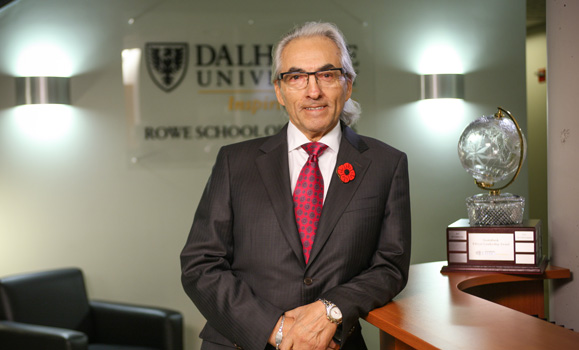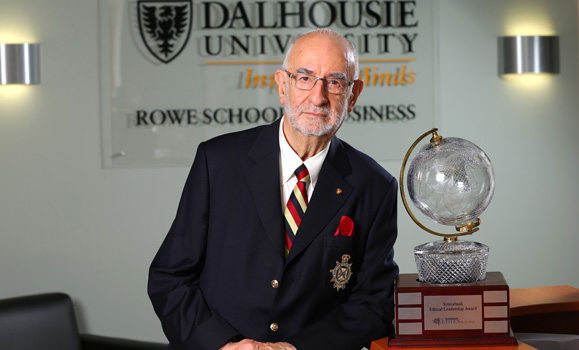One of Canada's most influential Aboriginal leaders and a knighted businessman — two very different stories, united by a commitment to ethical leadership.
On Friday, Chief Phil Fontaine and Sir Graham Day were announced as the inaugural recipients of the Scotiabank Ethical Leadership Award. The award was presented as part of the opening ceremonies for the case competition and conference, hosted by the Rowe School of Business this past weekend.
The award and the Ethics in Action event are supported by a $1.5 million donation made to ±«Óătv by Scotiabank, .
The Ethical Leadership Award recognizes Canadian leaders from a corporate, non-profit or government organization who has demonstrated outstanding ethical leadership within an organization. They must have maintained this leadership in the face of challenging situations that held serious consequences for both the organization and its stakeholders.
The judging panel assessed each nominee for strong ethical values, the degree to which they have focused the attention of their organization on ethics and infused their organization with ethical principles to guide the actions of employees.
“The Scotiabank Ethical Leadership Award celebrates leaders who demonstrate a high degree of ethical leadership, courage and conviction," said Brian Porter, president and CEO of Scotiabank. "Sir Graham Day and Chief Phil Fontaine exemplify these qualities in action."
Steadfast leadership
Chief Fontaine completed his third term as National Chief of the Assembly of First Nations in 2009. He is an officer of the Order of Canada and the Order of Manitoba, holds 15 honorary doctorate degrees and is a recipient of the National Aboriginal Achievement Award.

“Ethical leadership is about defining the greater good of those you lead and striving to make decisions consistent with it," said Chief Fontaine. "For First Nations’ leaders this often makes us unpopular. More often than not, the greater good for our people is not for the perceived greater good of the majority. Difficult decisions, whether they are decisions to expose abuses of the residential schools system or deciding to stop a resource development project that will violate fundamental Aboriginal values, are examples of what we as First Nations’ leaders are ethically required to do."
Chief Fontaine was in attendance to receive his award on Friday. Sir Graham, who sent along his regrets for being unable to be there in person, shared his regards via video.
Sir Graham, knighted by Queen Elizabeth II for his service to British industry, is a member of the Canadian Business Hall of Fame. He is also a Queen’s Counsel and has been the recipient of eight honorary doctorate degrees, the Canadian Forces Decoration (CD), the Queen’s Diamond Jubilee Medal and the Order of Nova Scotia. He has practiced law for over 50 years and has been a British business executive and a corporate director. He is currently Counsel to the Atlantic Canadian law firm Stewart McKelvey.

“I’ve tried all my life to do 'the right thing' because, simply, that’s how I was raised," said Sir Graham. "For me, law school and subsequently law practice enforced those behaviours. I hope it’s not just my age, but today I observe too many corners being cut and easy ways out taken, including doing nothing . . . I view ethical behaviours as central to civilization, without regard to culture, religion or ethnicity."
The award ceremony kicked off the first annual Ethics in Action event. Ethics in Action involves a case competition open to undergraduate business and MBA students from across Canada and the United States, along with a national essay and video contest. The program is built upon the success of the ±«Óătv Business Ethics Case Competition, which has been attracting teams of undergraduate business students from top U.S. and Canadian schools for the past nine years.
Look for full coverage of Ethics in Action later this week on Dal News.

